In a year already packed with political tension, the final weeks of June 2025 are bringing even more heat to Washington. The U.S. Supreme Court is preparing to deliver rulings on several explosive and high-profile cases—touching on Donald Trump, pornography laws, religious freedom, and presidential powers.
These decisions won’t just shape headlines—they could fundamentally alter how power, privacy, and belief intersect in modern America. As the Supreme Court wraps up its term, the spotlight is firmly on a series of cases with national consequences, many stemming from the Trump era and its lingering legal battles.
Why the Supreme Court’s June Decisions Matter
The end of the Supreme Court’s term is traditionally when the most controversial or complex rulings are announced. This year, that tradition holds true, with cases that reach into the heart of America’s political, cultural, and legal identity.
The major themes are:
- Whether Trump can claim immunity from prosecution.
- How religious rights will be balanced with anti-discrimination laws.
- The fate of pornography laws in the digital age.
- Clarifying the line between presidential power and accountability.
Each of these decisions could directly affect the 2024 presidential election, the balance of personal freedoms, and how Americans engage with both government and faith.
1. Trump and Presidential Immunity: Can He Be Prosecuted?
The Case at a Glance
One of the biggest Supreme Court decisions expected involves former President Donald Trump’s claim of absolute presidential immunity. Trump argues that actions taken during his presidency—even if controversial or potentially illegal—should be shielded from criminal prosecution.
This claim is part of a broader legal battle involving the events of January 6, 2021, when Trump was accused of inciting an insurrection at the Capitol. If the court rules in Trump’s favor, it could set a historic precedent for how much legal accountability a sitting or former president can face.
Potential Outcomes
- Immunity upheld: Trump cannot be prosecuted for presidential actions, which would likely delay or dismiss parts of his ongoing trials.
- Immunity denied or limited: Trump may face continued legal battles, potentially even during his 2024 campaign run.
Why It Matters
This decision could redefine the limits of presidential power—not just for Trump but for all future presidents. It could influence the balance of power between the executive branch and the justice system.
2. Religion vs. Rights: A Showdown Over Beliefs and Discrimination
The Religious Freedom Debate
Another major Trump Supreme Court decision centers on the conflict between religious liberty and anti-discrimination laws. A pending case involves whether a Christian-owned business can refuse services to LGBTQ+ clients, citing religious beliefs.
This echoes previous Supreme Court rulings, such as the Masterpiece Cakeshop case, but the upcoming decision may go further in defining the extent of religious protections.
What’s at Stake
- Can business owners legally deny services if it conflicts with their religious beliefs?
- Will anti-discrimination laws be weakened in favor of religious liberty?
- Could this open doors for broader refusal of services in the name of faith?
Wider Implications
A ruling favoring religious exemptions could encourage similar challenges across sectors—healthcare, education, public services—and reshape how religious freedom is interpreted in 21st-century America.
3. Pornography and the First Amendment: Free Speech in the Digital Age
The Porn Case Everyone’s Watching
One of the lesser-publicized, yet equally impactful, Trump Supreme Court decisions involves the regulation of online pornography and the First Amendment.
At the heart of the case is a state law, influenced by conservative Trump-era policies, that requires age verification for accessing adult content online. Free speech advocates say such laws infringe on constitutional rights, while supporters argue they’re essential to protect minors.
Key Questions
- Does requiring age verification violate free speech?
- How do we balance adult content access with child protection?
- Is online porn more like free expression—or harmful content that needs limits?
Impact of the Ruling
Depending on the outcome, this could set a new standard for online content regulation, influencing everything from adult websites to social media platforms. A win for regulation could lead to stricter controls on digital content, while a loss could strengthen free expression online.
4. A Pattern of Conservative Power
Many of these Trump Supreme Court decisions reflect the growing influence of the conservative majority on the bench, solidified during Trump’s presidency. With three Trump-appointed justices (Gorsuch, Kavanaugh, Barrett), the court has tilted right on several landmark rulings, including abortion rights and gun laws.
Observers believe this current term will only deepen that ideological shift, especially in cases involving:
- Executive authority
- Religious values
- Censorship vs. speech
This alignment raises questions about the future neutrality of the court and whether judicial decisions are being shaped by political ideology more than constitutional interpretation.

5. The Political Timing: Why Now Is Crucial
All these rulings are expected just months before the 2024 presidential election, where Donald Trump is the Republican frontrunner.
Depending on how the court rules:
- Trump may regain legal ground and momentum heading into the election.
- Or he may face renewed legal risks that weaken his campaign.
Either way, the Trump Supreme Court decisions will influence voter confidence, media narratives, and possibly the direction of campaign strategies across the country.
6. What Legal Experts Are Saying
On Trump’s Immunity
Legal scholars are deeply divided. Some argue immunity protects presidents from political witch-hunts. Others say allowing it opens the door to abuse of power without consequences.
On Religious Exemptions
Experts warn that overly broad religious protections could create a legal “slippery slope,” allowing discrimination in new forms under the guise of belief.
On Porn Regulation
There’s consensus that the internet needs guardrails for minors—but no agreement on how to do it without infringing First Amendment rights.
7. The Public Response: A Nation Divided
As decisions loom, Americans are already reacting. Activists, religious groups, and legal watchdogs are gearing up for either celebration or protest.
Expected Reactions
- Progressive groups fear rollbacks of rights and legal accountability.
- Conservative voices see the court restoring traditional values and order.
- Neutral observers call for transparency, fairness, and long-term vision.
This divide underscores just how high the stakes are.
Conclusion: A Defining Moment for America
The Trump Supreme Court decisions arriving this summer could mark a turning point in U.S. legal and political history. From presidential immunity to freedom of speech and religious rights, each ruling will ripple far beyond the courtroom—into homes, schools, elections, and everyday life.
No matter where you stand politically, one thing is clear: the Supreme Court is not just deciding cases—it’s shaping the future.
Read Next – Feds Wasted Millions on Fentanyl Detection Technology at the Border





